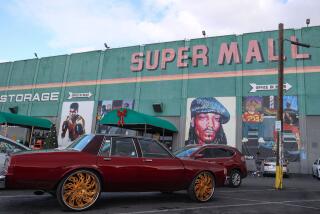Riot Flames Ignite Korean-American Political Activism
- Share via
On the first night of the riots, Jin Moo Chung, armed with two shotguns and plenty of ammunition, watched from a second-floor room as looters picked their way through his South-Central Los Angeles swap meet.
He had retreated there earlier in the evening after six people had tried to break in. “Get the hell out of here!” he had yelled. “If you come in, I’ll shoot!” They left, but returned a half an hour later and opened fire on the building.
Chung prepared for battle. The mob grew to 30 or 40. Alone, with no help in sight, Chung considered whether to shoot the looters. He fired a warning shot in the air. “I have a gun!” he shouted. “If you won’t shoot, I won’t shoot, either.”
Someone in the crowd fired, and Chung was hit in the chest.
“Why didn’t you shoot them?” I asked Chung when I visited him in the California Medical Center’s critical care unit last Friday. Instruments above his bed monitored his heart and his labored breathing. Tubes extended from his nose and arm.
It took Chung a while to answer. The fact that he spoke through an interpreter slowed the process even more.
He said it was because he is Asian, and the looters are African-American. If he had shot one, he was afraid it would have provoked even more racial conflict between Korean-Americans and African-Americans. He also knew some of the looters. They lived in the neighborhood and he didn’t want to shoot them.
I read about Chung in a story by Kay Hwangbo in the weekly English edition of the Korea Times, my window on the Korean-American community.
Through the Korea Times, I have followed the experiences of the immigrants and their children. Each week, I am reminded how the lives of these Asian-Americans are like those of my immigrant grandparents and their children.
Same small grocery stores, open seven days a week. Same kids working in the stores every day.
Work hard. Get ahead. Go to college. Make your parents proud.
The relationship between parents and children is a favorite theme of Korea Times stories. It’s often a story of conflict, a situation familiar to most immigrant families.
In the past year, this generational conflict was evident in arguments over how the community should deal the politics of a city run by non-Korean-Americans.
The first generation, unfamiliar with language and customs, has kept to itself. There’s also no time for politics if you’re keeping the store open seven days a week.
Politically, this has resulted in the Korean-Americans becoming an exploited and unrepresented minority. African-American, Latino and Anglo politicians have milked Koreatown for political contributions. But otherwise, City Hall’s bosses have pretty much ignored Koreatown.
I can drive for miles through Korean-American neighborhoods, past stores, banks, restaurants and factories owned by Korean-Americans. But I rarely see them in City Hall power circles.
In the last year, Korean-Americans have learned the price of not playing the game. In the furor over the probation sentence given to Soon Ja Du for the killing of Latasha Harlins, an African-American girl, the Korean-American community had trouble making its views known.
A frustrated younger generation advocated more political activism. Then, beginning on the night of April 29, the Korean-American community was devastated by the riots. “A minority’s minority--voiceless and powerless--has been singled out for destruction by a politically powerful but economically frustrated minority,” wrote K.W. Lee, English edition editor for the Korea Times.
In Koreatown, the riots marked the passing of the torch to the second generation.
It happened on Saturday, May 2, in Ardmore Park in the Mid-Wilshire district. Several thousand Korean-Americans attended a rally where many younger speakers protested the slow police response to looters and arsonists, and to pledge to rebuild.
“This is the first time this has happened in Koreatown,” Kee Ha, chairman of the organizing committee, told me that day.
I thought of the riots and the rally when I was leaving California Medical Center after visiting Jin Moo Chung.
Chung had told me he had a son in college, a daughter in high school and a son in the ninth grade. He’d lost all his money in the riot, all he’d earned after 12 years in this country. That means difficult times ahead for him, his wife and their children.
I didn’t get to meet his kids. But I hope, as they grow older, they’ll be marching with the new generation of Korean-American political activists. In doing that, they’ll honor their father, and his decision not to shoot.
More to Read
Sign up for Essential California
The most important California stories and recommendations in your inbox every morning.
You may occasionally receive promotional content from the Los Angeles Times.










